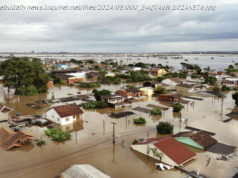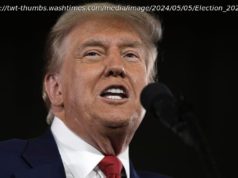WASHINGTON — As many flags around the nation remained at half-staff Monday to mourn Sen. John McCain, a Republican who had survived a Vietnam War prison camp and weathered the gradual coarsening of politics within his own party, the American flag flew at full-staff over the White House.
WASHINGTON — As many flags around the nation remained at half-staff Monday to mourn Sen. John McCain, a Republican who had survived a Vietnam War prison camp and weathered the gradual coarsening of politics within his own party, the American flag flew at full-staff over the White House.
In earlier rallies and tweets, President Donald Trump used harsh language to position McCain as a political foe who voted against the Republican Party’s best interests. On Monday, the president refused to comment when asked repeatedly about the death of the senator from Arizona, who died Saturday at 81 after a yearlong battle with brain cancer.
But McCain appeared to have planned in advance how to have the last word, as a close aide issued a pointed, posthumous rebuttal from the senator.
In a statement issued Monday in Arizona by Rick Davis, his family spokesman and former campaign manager, McCain was pointed in his condemnation of conflating “tribal rivalries” with patriotism.
“We weaken our greatness when we confuse our patriotism with tribal rivalries that have sown resentment and hatred and violence in all the corners of the globe,” McCain wrote. “We weaken it when we hide behind walls, rather than tear them down, when we doubt the power of our ideals, rather than trust them to be the great force for change they have always been.”
McCain was one of few Republicans in Congress who pushed back against Trump and publicly criticized his style of leadership. The senator’s statement delivered yet another sharp contrast to a president who has so far chosen not to participate with the rest of Washington in mourning the senator’s death.
“We are citizens of the world’s greatest republic, a nation of ideals, not blood and soil,” McCain wrote. The phrase “blood and soil” is a German nationalist slogan dating to the 19th century that has been resurrected by the alt-right and white nationalist movement in the United States.
“Do not despair of our present difficulties but believe always in the promise and greatness of America, because nothing is inevitable here,” McCain wrote to close his letter. “Americans never quit. We never surrender. We never hide from history. We make history.”
During an Oval Office event to tout a revamp of his trade deal with Mexico, Trump sat with his arms crossed and looked straight ahead as reporters asked him to expand on the single tweet he’d sent over the weekend offering his condolences to McCain’s loved ones.
The statement also highlighted the degree to which Trump is both unwanted and willing to be excluded from a weeklong series of events to memorialize McCain. Before he died, McCain had asked that Trump not attend his funeral, a snub that speaks to the late senator’s rocky relationship with the president.
The status of the White House flag made the rounds on social media, fueling speculation that its height was the president’s attempt to insult McCain. Earlier in the day, Trump posted messages on Twitter about professional football and golfer Tiger Woods.
A veterans’ group, VoteVets, criticized the president over the situation. “Donald Trump refuses to lower flag, for John McCain. As we said yesterday, Donald Trump is a pathetic, thin-skinned, self-centered, low-class, petty coward,” the group wrote in a Twitter post Monday.
Presidents often issue proclamations after significant events, like a mass shooting or the deaths of important figures, specifying when flags should fly at half-staff and for how long at federal buildings, military posts and facilities abroad, like embassies. There has not been a proclamation about McCain.
It was not immediately clear that the flag at the White House was raised Monday at the direction of the president, or if the flag is automatically fully raised absent a presidential proclamation to fly it at half-staff. The U. S. Flag Code provides for the lowering of the American flag on the day of the death of a member of Congress and the following day.
“Flag custom is always political by definition,” said Charles A. Spain, a director at the Flag Research Center. “The president has the ability to just reach out” and lower the flag. The president previously issued a proclamation for flags to be lowered on the day that the Rev. Billy Graham was buried early this year. Trump made the proclamation on Feb. 21, and Graham was buried in early March.
Flag policy has been a priority for Trump, even before he was president.
Trump has attacked players in the National Football League who kneel during the playing of the national anthem in a silent protest for civil rights, saying their actions were disrespectful to the flag and the U. S. military.
And in 2015, Trump criticized then-President Barack Obama for not lowering the flags soon enough after the shooting in Chattanooga, Tennessee, where five military members were killed.
Obama issued a proclamation in honor of the Chatanooga victims after Republicans criticized his inaction.
Trump, however, was similarly criticized earlier this summer for his delay in honoring the victims of a shooting in a newsroom in Annapolis, Maryland. Days after the shooting, Trump called for flags to be flown at half-staff.






